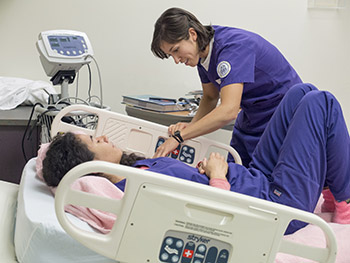ABSN—Accelerated Bachelor of Science in Nursing
Change lives – starting with yours.
Do you dream of impacting your community in new ways? If you have already earned a bachelor’s degree and are considering beginning a career in nursing, the Accelerated Bachelor of Science in Nursing (ABSN) program will help you achieve your goals in half the time of a traditional two-year BSN program.
Applications are now open for Spring 2024 and Fall 2024. Scholarships and financial aid are available for eligible, accepted students.
What makes our programs unique?
World class learning experiences.
ABSN program participants are provided with world class learning experiences at UW Seattle Campus where licensed care providers and highly respected faculty guide them through a robust and exciting curriculum that includes over 1,000 hours of hands on, patient care.
A state-of-the-art Simulation Center.
Our state of the art Simulation Center gives students the opportunity to hone their skills in a safe and controlled environment, while the preceptors at over 600 local partner hospitals and clinics, including Seattle Children’s Hospital and the top ranked University of Washington Medical Center ensure graduates from the program are ready to gain their license and begin practicing.
Clinical placement partnership program.
The UW School of Nursing partners with Clinical Placement Northwest (CPNW), providing accepted students with pre-arranged clinical placements with some of the best hospitals in the country. Our unique placement process allows students to focus their full attention on learning, knowing that their preceptorship and patient care experience is fully integrated into their matriculation plan.
Enthusiastic and committed support staff.
Our department of Student Academic Services is always present and ready to support you in your #HuskyNurse journey, providing highly engaging information sessions to prospective applicants as well as prescriptive advising and scholarship management support for accepted students to assist students in developing a strong foundation toward achieving their nursing dreams.
Interested in learning more, join an upcoming online information session or contact us at asknursing@uw.edu to find out if this program would be a great fit and how to create a quality application.
Program overview
Our unique four-quarter (autumn to summer, or spring to winter) full-time program is designed for students who are self-motivated, detail-oriented, self-reflective, and strongly committed. A solid foundation of science and humanities prerequisite coursework sets you up for success in our program.
The Accelerated BSN program includes:
- Coursework focused steeped in critical thinking, care and therapeutics, and health care resources.
- In-person lectures with experienced nurse practitioners and researchers
- Clinical simulation exercises in our state-of-the-art Learning Lab, and
- Supervised direct patient care in the field.
Graduates of the Accelerated BSN program are prepared to:
- Apply leadership concepts, including highly effective communication to manage highly complex situations and facilitate clinical decision making that leads to the delivery of safe and effective nursing care for patients and their families.
- Appraise, summarize, and translate current evidence, knowledge, processes, and the principles of patient safety to facilitate quality improvement and skillfully apply them, bridging the experience of learning nursing science to engaging in nursing practice.
- Understand social determinants of health and the impact of proximity and positioning regarding economic, legal, and education policy development, a myriad of political and socio-cultural experiences, community settings, particularly communities that have been historically disrupted, underserved, and access to critical information on research regarding disparate health outcomes within their cultural community.
- Deliver and advocate for health promotion and disease prevention strategies at the individual, family, community, and population levels.
- Demonstrate value-based professional behaviors that integrate compassion, autonomy, integrity, social justice, ethics, and respect for diversity and human dignity.
- Understand and interrogate the dynamics of power in patient-provider interactions and demonstrate the psychomotor skills necessary to interrupt any implicit and explicit bias as a function of anti-racism principles in action, all of which promote health equity.
